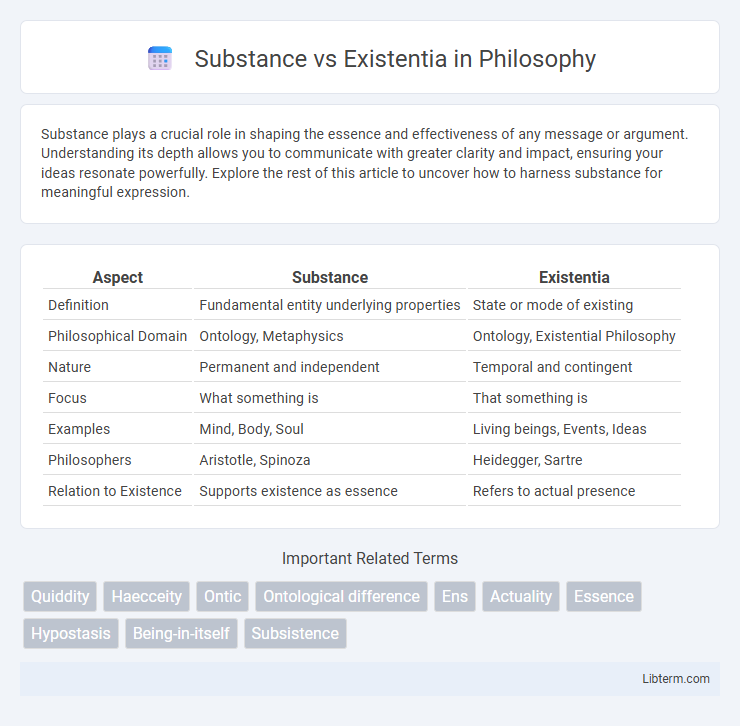Substance plays a crucial role in shaping the essence and effectiveness of any message or argument. Understanding its depth allows you to communicate with greater clarity and impact, ensuring your ideas resonate powerfully. Explore the rest of this article to uncover how to harness substance for meaningful expression.
Table of Comparison
| Aspect | Substance | Existentia |
|---|---|---|
| Definition | Fundamental entity underlying properties | State or mode of existing |
| Philosophical Domain | Ontology, Metaphysics | Ontology, Existential Philosophy |
| Nature | Permanent and independent | Temporal and contingent |
| Focus | What something is | That something is |
| Examples | Mind, Body, Soul | Living beings, Events, Ideas |
| Philosophers | Aristotle, Spinoza | Heidegger, Sartre |
| Relation to Existence | Supports existence as essence | Refers to actual presence |
Understanding the Concepts: Substance and Existentia
Substance refers to the fundamental essence or underlying reality that constitutes an entity, providing its core identity and permanence despite changes. Existentia denotes the actual state of being or existence that brings a substance into concrete realization within a particular context or moment. Understanding the distinction between substance as the inherent nature and existentia as the dynamic manifestation is crucial for grasping metaphysical and ontological frameworks.
Historical Foundations of Substance
The historical foundations of substance trace back to ancient Greek philosophy, notably Aristotle, who defined substance as that which exists independently and serves as a subject for properties. This concept evolved through Scholasticism, where thinkers like Thomas Aquinas integrated Aristotelian substance with Christian theology, emphasizing substance as the underlying reality supporting accidents. The distinction between substance and existence gained further complexity in medieval and early modern philosophy, shaping metaphysical debates on being and reality.
Development of Existentia in Philosophy
Existentia in philosophy evolved as a response to traditional notions of substance, emphasizing the primacy of existence over essence. Thinkers such as Heidegger and Sartre advanced Existentia by exploring being as dynamic, autonomous, and situated in temporal reality. This development shifted focus from static substance ontology to existential conditions and individual experience.
Substance in Classical Metaphysics
In classical metaphysics, substance is the fundamental entity that exists independently and underlies all properties and changes, serving as the bearer of attributes. Substance provides the ontological foundation for existence by maintaining identity through time despite variations in its accidental properties. Philosophers like Aristotle defined substance as primary being, distinct from mere existence (existentia), emphasizing its role as the essential, self-sufficient reality.
Existentia: Existence as a Philosophical Principle
Existentia in philosophy emphasizes existence as a fundamental principle, asserting that being itself precedes essence and defines reality. It challenges traditional substance metaphysics by prioritizing the dynamic and lived experience of existence over static entities. This approach underlines the primacy of existence in understanding identity, meaning, and the nature of being.
Ontological Distinctions: Being vs. Essence
Substance refers to the fundamental underlying reality that exists independently, whereas existentia denotes the actual mode or act of existing in a particular context. In ontological distinctions, being (ens) is the actual concrete existence, while essence (essentia) represents the defining nature or whatness of a thing, which may or may not imply existence. The differentiation between substance and existentia highlights the crucial philosophical debate on whether essence can be separated from existence or if existence actualizes essence.
Substance and Existentia in Modern Thought
Substance in modern thought refers to the fundamental entity or essence that underlies and persists through change, often conceptualized as an independent and self-sufficient reality. Existentia emphasizes the act of existing or the concrete manifestation of being, prioritizing existence over inherent essence or substance. Contemporary philosophy explores the dynamic interplay between Substance as the unchanging core and Existentia as the contingent, evolving presence in shaping reality and identity.
Key Philosophers on Substance and Existentia
Aristotle's concept of substance as the fundamental reality underpins much of Western metaphysics, emphasizing substances as individual entities that exist independently and possess attributes. In contrast, existentialist philosophers like Jean-Paul Sartre prioritize existentia, focusing on human existence as defined by freedom, choice, and subjective experience rather than essence. Thomas Aquinas synthesized Aristotelian substance with Christian theology, highlighting substance as the basis of being, while Heidegger revolutionized existential ontology by analyzing Dasein, underscoring existence as a dynamic, situated process rather than a static substance.
The Relevance of Substance vs. Existentia Today
The relevance of substance versus existentia remains crucial in contemporary metaphysics, especially in debates about the nature of reality and identity. Substance theory posits that objects have an underlying essence that persists through change, while existentia emphasizes the contingent existence of entities without fixed essence. This distinction influences ongoing discussions in ontology, artificial intelligence, and philosophy of mind, highlighting how entities maintain continuity or emerge in evolving contexts.
Comparative Analysis: Substance and Existentia in Contemporary Debate
Substance and Existentia represent core metaphysical concepts with distinct ontological implications; substance typically denotes an underlying entity that possesses properties independently, whereas existentia emphasizes the mode or act of existence itself. Contemporary debates focus on whether substance or existentia better accounts for the persistence and identity of entities, especially in relation to modern ontological theories like existentialism and process philosophy. This comparative analysis reveals that substance prioritizes substance-essence dichotomies, while existentia foregrounds existence as a dynamic, temporal phenomenon, reshaping classical metaphysical discourse.
Substance Infographic

 libterm.com
libterm.com